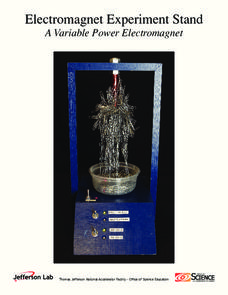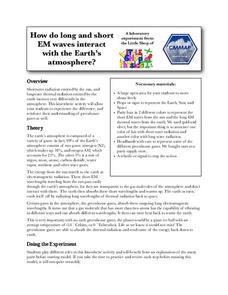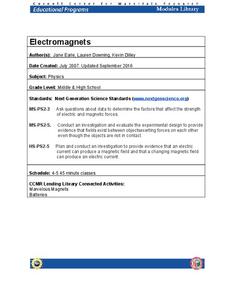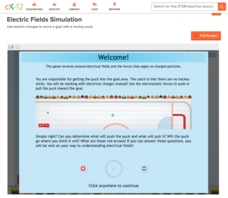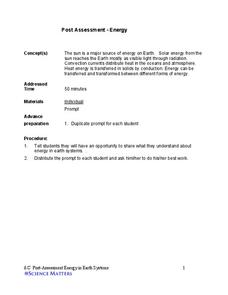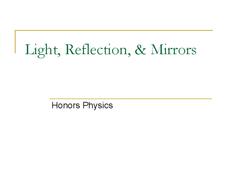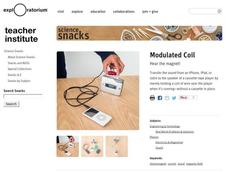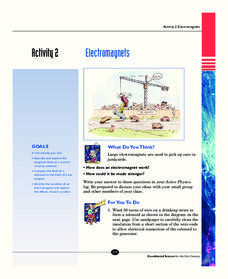Science Matters
Forms of Energy
The amount of energy Americans use doubles every 20 years. The first lesson in a 10-part series teaches scholars about different forms of energy. They rotate through five stations with hands-on activities or experiments at each in order...
Curated OER
Regents High School Examination: Physical Setting Earth Science 2008
Throughout this earth science exam, high-school geologists complete a series of multiple choice and short answer questions about the solar system, atmosphere, and earth system. This is an amazing test, as are all of the exams developed...
Curated OER
Electromagnetic Energy and Its Spectrum
Your older elementary students investigate electromagnetic energy and the electromagnetic spectrum. They will observe 7 items represented in the electromagnetic spectrum and make a poster of all the things the items have in common. After...
Bonneville
Introduction to Energy
Transform the classroom with energy. Pupils learn about different types of energy and practice identifying the types in the first lesson of six in a solar versus wind energy unit. The class sees examples of how one type of energy can be...
NASA
Speaking in Phases
Hear from deep space. Pupils learn how satellites transfer information back to Earth. They learn about three different ways to modulate radio waves and how a satellite sends information with only 0s and 1s. Using sound, class members...
Science Matters
Hot Wire S’mores
The proof is in the marshmallows. Believing that electric energy can transform into heat energy can be abstract, but a hands-on lesson gives pupils a concrete example. Young scientists cut marshmallows with copper wires before and...
Science Matters
Electromagnets
Classes are sure to get all wrapped up in an attractive lesson plan! Young scientists learn how to combine electricity and magnetism as they create electromagnets. They create their own electromagnets and collect data on their...
US Department of Energy
The Invisible Electromagnet: A Transparent Magnetic Field Viewer
Audio speakers, hard drives, credit cards, and even the earth use magnetic fields. While we observe the effect of magnetic fields, we can't actually see them. A viewer helps participants explore magnetic fields, some of the items that...
US Department of Energy
Electromagnet Experiment Stand: A Variable Power Electromagnet
Electromagnets come in both large and small scales—from big machinery in scrap yards to hard disk drives. Here's a resource that provides directions for building a variable electromagnet on a stand. Scholars then experiment with the...
Science 4 Inquiry
Introducing the Types of Energy
Young scientists explore many different types of energy including light, heat, nuclear, sound, potential, and more. They match the types of energy and identify when energy transfers from one type to another.
Colorado State University
How Do Long and Short EM Waves Interact with the Earth's Atmosphere?
Things are about to heat up in your classroom! A kinesthetic lesson asks learners to play the part of the gases in the earth's atmosphere and interact with the sun's radiation. The focus is to learn the impact of the increasing...
Cornell University
Electromagnets
Discover the connection between electric current and magnets. Scholars create electromagnets by passing a magnet through a coil. They experiment with different materials to determine the variables that affect the strength of the current.
CK-12 Foundation
Electric Fields Simulation
Can you get the puck into the goal using only electric charges on the ice? Scholars experiment with electrostatic forces as they determine which charges pull the puck and which repel it. Multiple levels reinforce different related...
Science Matters
Post-Assessment Energy
After nine lessons and activities about energy, here is the final assessment. The 20-questions include multiple choice, multiple choice with justification, short answer, answer analysis, and labeling diagrams to challenge learners.
Laboratory for Atmospheric and Space Physics
Features of the Sun
An engaging tutorial teaches all about the sun. Learners see its different layers, explore the sun using different filters, and read about its different features. They then choose one feature to research and explore further.
Bowels Physics
Light, Reflection, and Mirrors
Explore the connection of light, reflection, and mirrors. A comprehensive lesson introduces the basics of light in relation to reflection and mirrors. After an explanation of the vocabulary, the presentation shows how to create ray...
PHET
Generator
Michael Faraday was self-educated, earned an honorary doctorate from the University of Oxford, invented the first Bunsen burner, discovered the laws of electrolysis, and proved that a changing magnetic field produces a current. In this...
Teach Engineering
Electromagnetic Radiation
How can nanoparticles be used in the battle against skin cancer. Class members take on the question as they gather information about electromagnetic radiation, specifically ultraviolet radiation. Pupils learn about the mathematical...
Urbana School District
Magnetism
The compass was first used in 206 B.C., but we didn't discover magnetic poles until 1263 A.D. Presentation begins with the history of magnetism before continuing on to magnetic fields, magnetic forces, electromagnets, currents,...
Exploratorium
Modulated Coil
Transmit sound with an electromagnet. Class members follow the provided direction and build an electromagnet that will transmit sound though a cassette-tape player. As as extension they create an air core electromagnet and...
Chymist
Make a Low Energy Radio Transmitter
How do you demonstrate radio transmissions? Pupils build a low-energy radio transmitter by constructing two coils from magnet wire and connecting them to audio/phone plugs. The resource provides the details on how to build the...
Virginia Department of Education
Electricity and Magnetism
Take charge of your class and provide them with an electrical experience! Individuals investigate the basic principles of electricity and magnetism by creating a model to test electric current and the amount of electricity generated....
It's About Time
Electromagnets
Young scientists build their own electromagnet and test it by picking up paperclips. Analysis questions evaluate knowledge at the end of the activity.
PBS
Electromagnetic Spectrum | UNC-TV Science
Illuminate lightwaves, even those not visible to the human eye, in a concise activity about the electromagnetic spectrum. Pupils watch and listen to an animated video describing the electromagnetic spectrum as well as frequency and...










